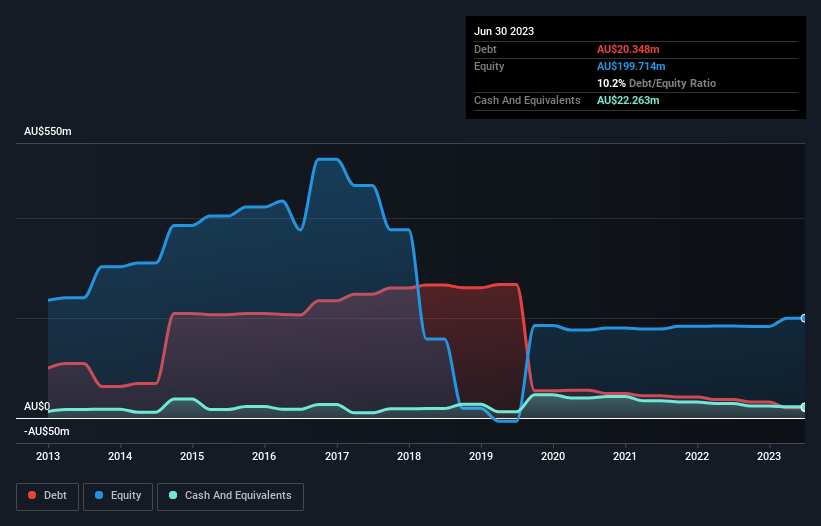David Iben put it well when he said, 'Volatility is not a risk we care about. What we care about is avoiding the permanent loss of capital.' So it seems the smart money knows that debt - which is usually involved in bankruptcies - is a very important factor, when you assess how risky a company is. We can see that Retail Food Group Limited (ASX:RFG) does use debt in its business. But should shareholders be worried about its use of debt?
When Is Debt Dangerous?
Debt is a tool to help businesses grow, but if a business is incapable of paying off its lenders, then it exists at their mercy. Ultimately, if the company can't fulfill its legal obligations to repay debt, shareholders could walk away with nothing. However, a more frequent (but still costly) occurrence is where a company must issue shares at bargain-basement prices, permanently diluting shareholders, just to shore up its balance sheet. Having said that, the most common situation is where a company manages its debt reasonably well - and to its own advantage. The first step when considering a company's debt levels is to consider its cash and debt together.
Check out our latest analysis for Retail Food Group
How Much Debt Does Retail Food Group Carry?
You can click the graphic below for the historical numbers, but it shows that Retail Food Group had AU$20.3m of debt in June 2023, down from AU$37.0m, one year before. However, it does have AU$22.3m in cash offsetting this, leading to net cash of AU$1.92m.

How Strong Is Retail Food Group's Balance Sheet?
Zooming in on the latest balance sheet data, we can see that Retail Food Group had liabilities of AU$51.1m due within 12 months and liabilities of AU$98.1m due beyond that. Offsetting these obligations, it had cash of AU$22.3m as well as receivables valued at AU$33.6m due within 12 months. So its liabilities outweigh the sum of its cash and (near-term) receivables by AU$93.3m.
This is a mountain of leverage relative to its market capitalization of AU$127.7m. This suggests shareholders would be heavily diluted if the company needed to shore up its balance sheet in a hurry. Despite its noteworthy liabilities, Retail Food Group boasts net cash, so it's fair to say it does not have a heavy debt load! The balance sheet is clearly the area to focus on when you are analysing debt. But ultimately the future profitability of the business will decide if Retail Food Group can strengthen its balance sheet over time. So if you want to see what the professionals think, you might find this free report on analyst profit forecasts to be interesting.
Over 12 months, Retail Food Group reported revenue of AU$111m, which is a gain of 8.6%, although it did not report any earnings before interest and tax. We usually like to see faster growth from unprofitable companies, but each to their own.
So How Risky Is Retail Food Group?
We have no doubt that loss making companies are, in general, riskier than profitable ones. And in the last year Retail Food Group had an earnings before interest and tax (EBIT) loss, truth be told. And over the same period it saw negative free cash outflow of AU$5.4m and booked a AU$8.9m accounting loss. Given it only has net cash of AU$1.92m, the company may need to raise more capital if it doesn't reach break-even soon. Overall, we'd say the stock is a bit risky, and we're usually very cautious until we see positive free cash flow. When analysing debt levels, the balance sheet is the obvious place to start. However, not all investment risk resides within the balance sheet - far from it. For instance, we've identified 2 warning signs for Retail Food Group that you should be aware of.
When all is said and done, sometimes its easier to focus on companies that don't even need debt. Readers can access a list of growth stocks with zero net debt 100% free, right now.
New: AI Stock Screener & Alerts
Our new AI Stock Screener scans the market every day to uncover opportunities.
• Dividend Powerhouses (3%+ Yield)
• Undervalued Small Caps with Insider Buying
• High growth Tech and AI Companies
Or build your own from over 50 metrics.
Have feedback on this article? Concerned about the content? Get in touch with us directly. Alternatively, email editorial-team (at) simplywallst.com.
This article by Simply Wall St is general in nature. We provide commentary based on historical data and analyst forecasts only using an unbiased methodology and our articles are not intended to be financial advice. It does not constitute a recommendation to buy or sell any stock, and does not take account of your objectives, or your financial situation. We aim to bring you long-term focused analysis driven by fundamental data. Note that our analysis may not factor in the latest price-sensitive company announcements or qualitative material. Simply Wall St has no position in any stocks mentioned.
About ASX:RFG
Retail Food Group
A food and beverage company, engages in the management of a multi-brand retail food and beverage franchise in Australia and internationally.
Good value with adequate balance sheet.
Market Insights
Community Narratives



